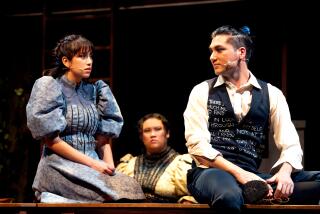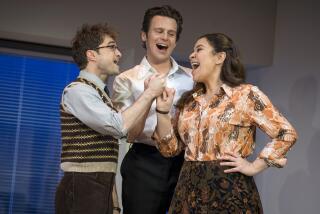THEATER REVIEW : ‘Student Prince’ Makes Rare but Welcome Visit Like an Old Friend
- Share via
LA MIRADA — When Sigmund Romberg’s “The Student Prince” opened on Broadway in 1924, America took it to its heart. The operetta held the record at the time as Broadway’s longest-running musical, and it was a staple of amateur theater for many years--until times changed, along with styles and taste.
“The Student Prince” is rarely done these days. In this Whittier-La Mirada Light Opera Assn. revival it looks, and sounds, like an old friend. A welcome old friend at that.
The story is as slight as ever. Based on a German short story that was later adapted to the stage as “Old Heidelberg,” it tells of a sheltered prince who finishes his education at the University of Heidelberg, only to revel in his freedom and to fall in love with a waitress at the obligatory inn.
Dorothy Donnelly’s book and lyrics are as delightful today as they were to the show’s original audiences. Songs such as “Golden Days,” “Deep in My Heart,” “Serenade” and the rousing “Drinking Song”--of course, with clanking mugs in front of that constant inn--seem fresh; it’s been that long since they’ve been heard.
The show might look a bit older than it does, a bit more tired, if it were not for the exceptional company, under Gary Gordon’s lively direction, that brings it to life. Lee Martino’s choreography might not be as inventive or as lively as it could be, but the tempos are kept exciting by musical director Dennis Castellano. His orchestra almost sounds like a Broadway pit orchestra, and that is high praise.
At the core of the production are top-notch performances by the leads. As Prince Karl Franz, Raymond Saar’s robust baritone is equally electric in his ballads and up-tempo numbers.
Also impressive is William Chapman’s Dr. Engel, the young prince’s guide to the pleasures of the common life. His vocal richness and power and the gentleness of his guidance are just right. Cori Lanting-McCormick, as Kathie, the light of Karl Franz’s love, also scores with a strikingly romantic soprano voice and a nice lightness with the dialogue.
The energy of the company, including the boisterous “Band of Saxons” and the waitresses at the inn, help keep the evening light and entertaining. The supporting cast has some standouts, particularly George Strattan’s pompous valet, Lutz, in a comic performance perfect for the genre; the equally pompous young officer Tarnitz played by Christopher Sanders, whose full, deeply patinated voice highlights brief appearances, and the infectious energy of Russell Montooth and Scott Brotherton as two of the prince’s student cohorts.
Robert Bingham’s scenery, originally designed for a Pittsburgh Civic Light Opera production, is period-perfect and charming, except for the office of Prime Minister Von Mark, which is much too big for its short scenes and looks a little the worse for wear. A smaller inset would have been more effective. Sometimes less is more, as during Karl Franz’s hymn accepting his lonely fate as king, “I’ll Walk With God,” when Saar is discovered kneeling on a lone cushion, with a hint of cathedral lights playing on a dark scrim behind him. It’s a high point of the show, Saar’s best number, and it needs no more framework than it has.
That cathedral effect, a sort of painting with light, is indicative of Raun Yankovich’s fine lighting design throughout. Only once on the night reviewed did his subtle and imaginative changes in lighting tone become obvious. Mostly imperceptible were the gradual shifting of tones as musical numbers began.
Chuck McCarroll’s sound design is exceptionally clear and warm; for once, amplified voices are not annoying. Scott A. Lane’s costumes are right in period, except for his military uniforms (especially the students’), which are incorrectly baggy, without the sharp lines of the time.
One jarring note should be corrected. Following a toast, glasses are tossed over the shoulder, only to bounce several times before coming to rest. Plastic tumblers were a long time coming after the show’s original debut, even longer after the time of the action. It is out of place in the world that Romberg and Donnelly imagined, and in our fond memories of that world.
More to Read
The biggest entertainment stories
Get our big stories about Hollywood, film, television, music, arts, culture and more right in your inbox as soon as they publish.
You may occasionally receive promotional content from the Los Angeles Times.










